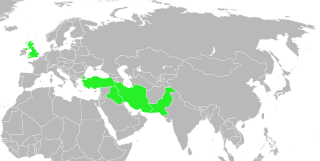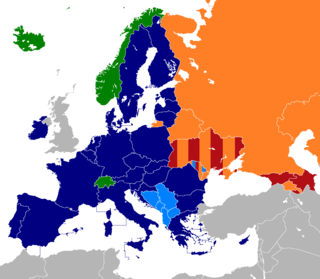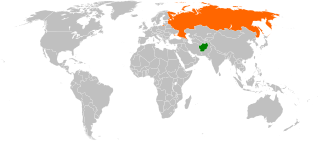Related Research Articles

Foreign relations of Kazakhstan are primarily based on economic and political security consideration. The Nazarbayev administration has tried to balance relations with Russia and the United States by sending petroleum and natural gas to its northern neighbor at artificially low prices while assisting the U.S. in the War on Terror. Kazakhstan is a member of the United Nations, Collective Security Treaty Organization, Organization for Security and Co-operation in Europe, North Atlantic Cooperation Council, Commonwealth of Independent States, the Shanghai Cooperation Organisation, and NATO's Partnership for Peace program. Kazakhstan established a customs union with Russia and Belarus which eventually became the Eurasian Economic Union. President Nazarbayev has prioritized economic diplomacy into Kazakhstan's foreign policy.

The Islamic Republic of Pakistan emerged as an independent country through the partition of India in August 1947 and was admitted as a United Nations member state in September 1947. It is currently the second-largest country within the Muslim world in terms of population, and is also the only Muslim-majority country in possession of nuclear weapons. De facto, the country shares direct land borders with India, Iran, Afghanistan, and China.

The Economic Community of West African States is a regional political and economic union of fifteen countries of West Africa. Collectively, the countries comprise an area of 5,114,162 km2 (1,974,589 sq mi) and have an estimated population of over 424.34 million.

The Shanghai Cooperation Organisation (SCO) is a Eurasian political, economic, international security and defence organization established by China and Russia in 2001. It is the world's largest regional organization in terms of geographic scope and population, covering approximately 80% of the area of Eurasia and 40% of the world population. As of 2023, its combined GDP based on PPP was around 32% of the world's total.

The Central Treaty Organization (CENTO), formerly known as the Middle East Treaty Organization (METO) and also known as the Baghdad Pact, was a military alliance of the Cold War. It was formed on 24 February 1955 by Iran, Iraq, Pakistan, Turkey, and the United Kingdom. The alliance was dissolved on 16 March 1979.

The South Asian Association for Regional Cooperation (SAARC) is the regional intergovernmental organization and geopolitical union of states in South Asia. Its member states are Afghanistan, Bangladesh, Bhutan, India, Maldives, Nepal, Pakistan, and Sri Lanka. SAARC comprises 3% of the world's land area, 21% of the world's population and 5.21% of the global economy, as of 2021.

The Economic Cooperation Organization or ECO is a Eurasian political and economic intergovernmental organization that was founded in 1985 in Tehran by the leaders of Iran, Pakistan, and Turkey. It provides a platform to discuss ways to improve development and promote trade and investment opportunities. The ECO is an ad hoc organisation under the United Nations Charter. The objective is to establish a single market for goods and services, much like the European Union. After the dissolution of the Soviet Union, the ECO expanded to include Afghanistan, Azerbaijan, Kazakhstan, Kyrgyzstan, Tajikistan, Turkmenistan, and Uzbekistan in 1992.

At present, there are six multi-lateral free trade areas in Europe, and one former free trade area in recent history. Note that there are also a number of bilateral free trade agreements between states and between trade blocks; and that some states participate in more than one free trade area.

Although there has been a large degree of integration between European Union member states, foreign relations is still a largely intergovernmental matter, with the 27 states controlling their own relations to a large degree. However, with the Union holding more weight as a single entity, there are at times attempts to speak with one voice, notably on trade and energy matters. The High Representative of the Union for Foreign Affairs and Security Policy personifies this role.

Iran and Pakistan established relations on 14 August 1947, the day of the independence of Pakistan, when Iran became the first country to recognize Pakistan. Both sides continue to cooperate economically where possible and have formed alliances in a number of areas of mutual interest, such as fighting the drug trade along their border and combating the insurgency in the Balochistan region.

Iran–Turkey relations are the bilateral relations between the Islamic Republic of Iran and the Republic of Turkey. The two states' relationship is complex and characterized by periods of both tension and cooperation, as both Iran and Turkey are fighting for influence in the Middle East through supporting opposing proxies as part of a proxy conflict. The two countries are also major trade partners and are perceived as mutually interdependent due to geographical proximity as well as historically shared cultural, linguistic, and ethnic traits.
The ECO Cup was a football competition for members of Economic Cooperation Organization. Previously it was known as RCD Cup, RCD abbreviates Regional Corporation for Development and was an economic cooperation between Iran, Pakistan and Turkey from 1964 to 1979. A new organisation, ECO, was set up in 1985. In 1992, Afghanistan, Uzbekistan, Tajikistan, Turkmenistan, Kazakhstan, Kyrgyzstan and Azerbaijan joined ECO.

Seyed Mohammad Hossein Adeli is an Iranian politician, diplomat, economist and academic. He was the Secretary General of the Gas Exporting Countries Forum from 2014 until 2018. He is the founder of Ravand Institute. He was the chairman of Iran's first Investment Bank Amin Investment Bank until 2011. In May 2014, he received the Order of the Rising Sun from the Emperor of Japan, Akihito, the highest Order given to any Iranian National for his important role in the Iran–Japan relations.

Relations between Afghanistan and Russia first emerged in the 19th century. At the time they were placed in the context of "The Great Game", Russian–British confrontations over Afghanistan from 1840 to 1907. The Soviet Union was the first country to establish diplomatic relations with Afghanistan following the Third Anglo-Afghan War in 1919. On 28 February 1921, Afghanistan and the Soviet Russia signed a Friendship Treaty. The Soviet Union intervened in Afghanistan against the Basmachi movement in 1929 and 1930.
Shamshad Ahmad is a veteran Pakistani diplomat, international relations expert and an author who served in BPS-22 grade as the Foreign Secretary of Pakistan from 1997 to 2000. He also served as the Permanent Representative of Pakistan to the United Nations between 2000 till 2002. Shamshad Ahmad also was the Pakistan's ambassador to South Korea and Iran.

Pakistan formally consummated diplomatic ties with Kyrgyzstan on May 10, 1992, although relations were initially founded on December 20, 1991, shortly after Kyrgyzstan became independent of the Soviet Union. Consequently, Pakistan opened its diplomatic outpost in Bishkek in 1995.

The Eurasian Economic Union is an economic union of five post-Soviet states located in Eurasia. The EAEU has an integrated single market. As of 2023, it consists of 183 million people and a gross domestic product of over $2.4 trillion.
The 2017 ECO summit was the 13th summit of the Economic Cooperation Organization, held on 1 March 2017 in Islamabad, Pakistan.
The Organization for Economic Co-operation is an intergovernmental organization established in 1985 with cooperation of Turkey, Iran and Pakistan. The crucial goal of this organization is to achieve sustainable economic development, promote trade, integrate to the world economy and develop efficient transport system. Azerbaijan joined the organization in 1992. From August 2012 till 2016, the Secretary General of ECO is a representative from Azerbaijan.
References
- ↑ Joseph A. Kechichian (30 December 2012). "Central Treaty Organization". Encyclopaedia Iranica v3. pp. 259–260. Retrieved February 18, 2017.
- ↑ Yeşilbursa, Behçet Kemal (22 July 2009). "The Formation of RCD: Regional Cooperation for Development". Middle Eastern Studies. 45 (4): 637–660. doi:10.1080/00263200903009759. S2CID 145131642.
- ↑ "Regional Cooperation for Development (RCD)". My Philatelic World blog. February 2010. Archived from the original on February 18, 2017. Retrieved February 18, 2017.